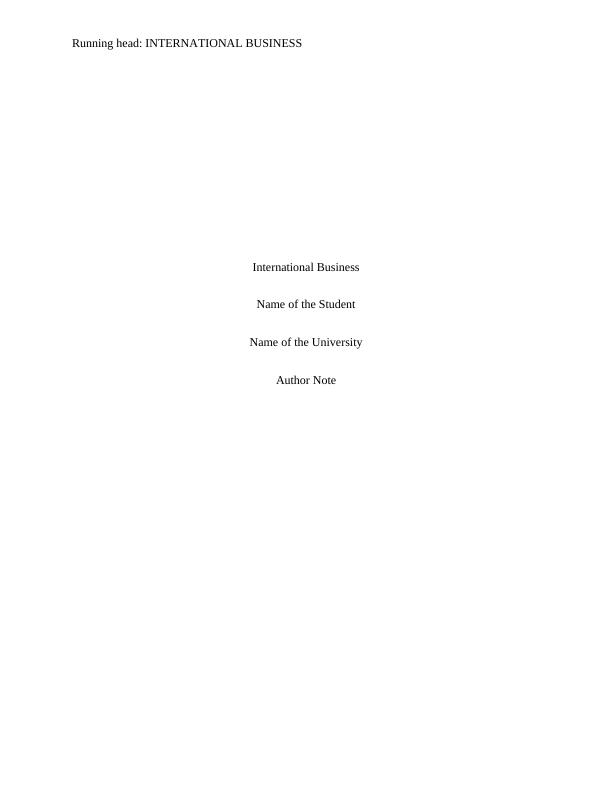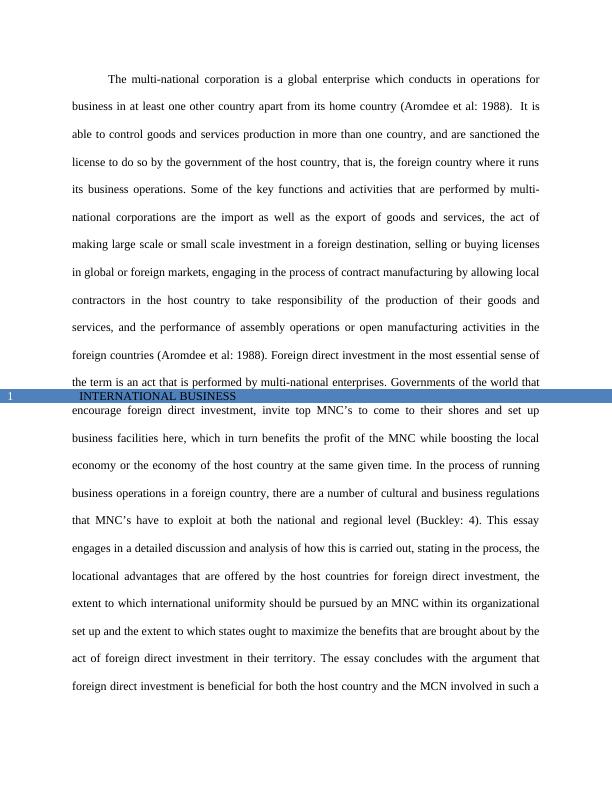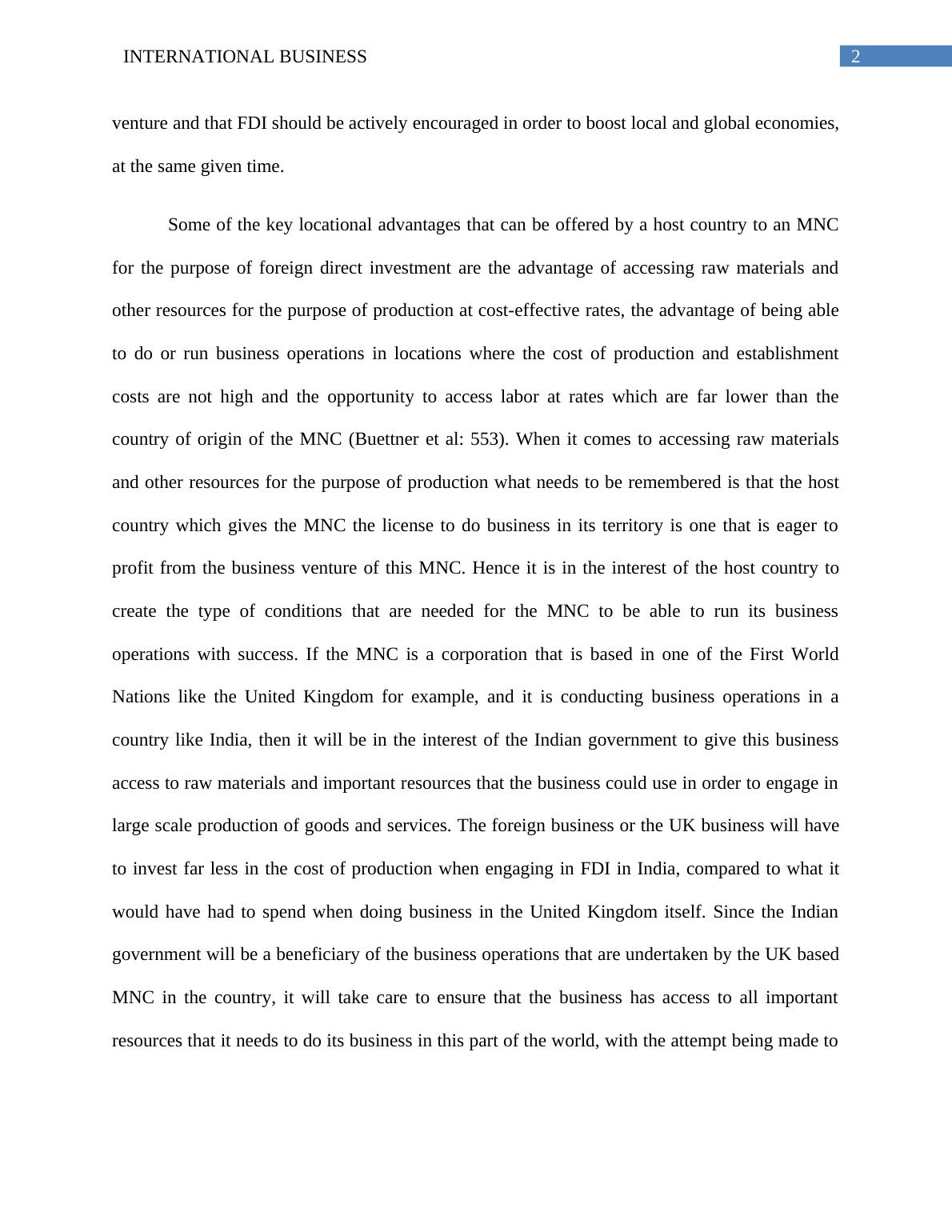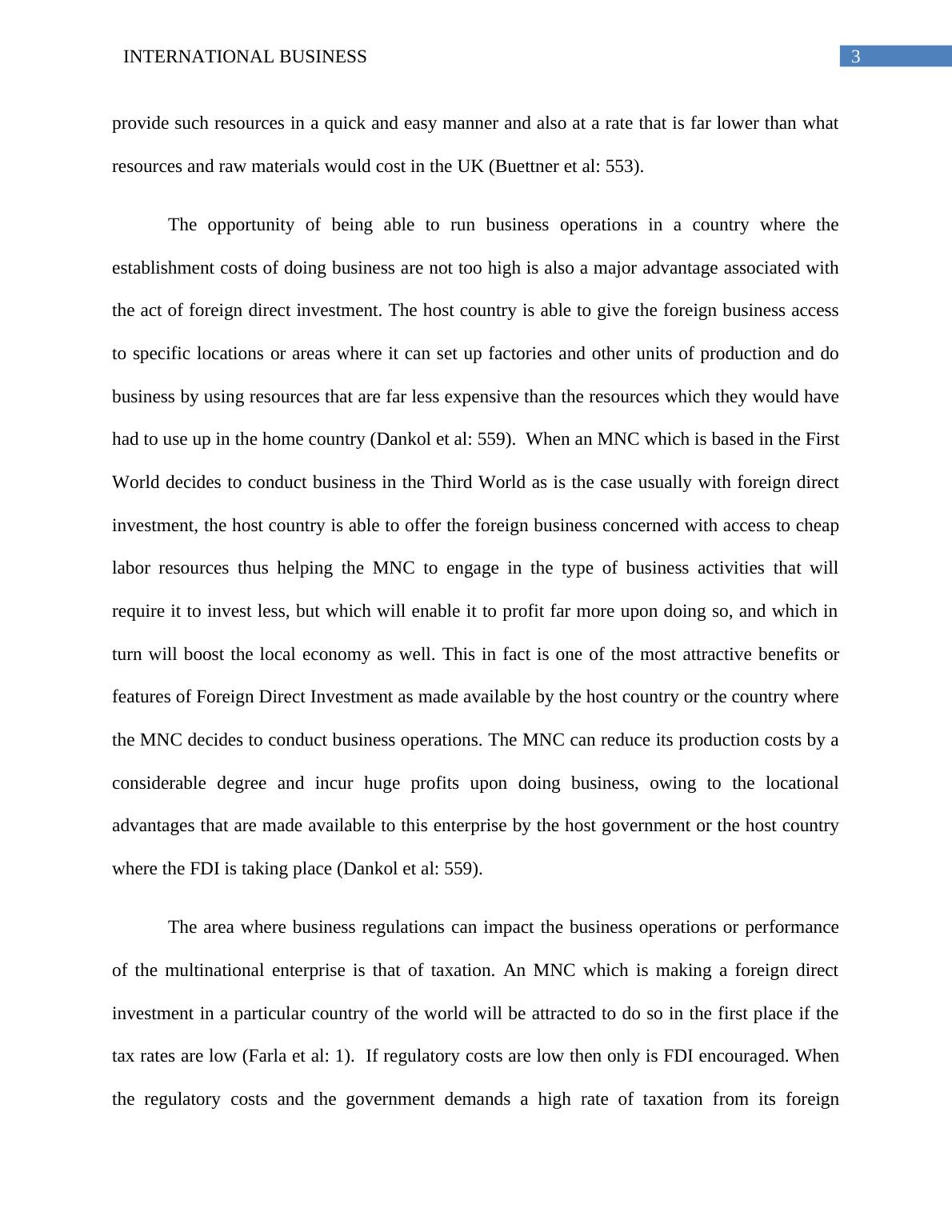International Business | Essay
Analyzing how MNCs exploit cultural and regulatory differences and suggesting appropriate state responses.
12 Pages3797 Words14 Views
Added on 2022-08-21
International Business | Essay
Analyzing how MNCs exploit cultural and regulatory differences and suggesting appropriate state responses.
Added on 2022-08-21
ShareRelated Documents
Running head: INTERNATIONAL BUSINESS
International Business
Name of the Student
Name of the University
Author Note
International Business
Name of the Student
Name of the University
Author Note

INTERNATIONAL BUSINESS1
The multi-national corporation is a global enterprise which conducts in operations for
business in at least one other country apart from its home country (Aromdee et al: 1988). It is
able to control goods and services production in more than one country, and are sanctioned the
license to do so by the government of the host country, that is, the foreign country where it runs
its business operations. Some of the key functions and activities that are performed by multi-
national corporations are the import as well as the export of goods and services, the act of
making large scale or small scale investment in a foreign destination, selling or buying licenses
in global or foreign markets, engaging in the process of contract manufacturing by allowing local
contractors in the host country to take responsibility of the production of their goods and
services, and the performance of assembly operations or open manufacturing activities in the
foreign countries (Aromdee et al: 1988). Foreign direct investment in the most essential sense of
the term is an act that is performed by multi-national enterprises. Governments of the world that
encourage foreign direct investment, invite top MNC’s to come to their shores and set up
business facilities here, which in turn benefits the profit of the MNC while boosting the local
economy or the economy of the host country at the same given time. In the process of running
business operations in a foreign country, there are a number of cultural and business regulations
that MNC’s have to exploit at both the national and regional level (Buckley: 4). This essay
engages in a detailed discussion and analysis of how this is carried out, stating in the process, the
locational advantages that are offered by the host countries for foreign direct investment, the
extent to which international uniformity should be pursued by an MNC within its organizational
set up and the extent to which states ought to maximize the benefits that are brought about by the
act of foreign direct investment in their territory. The essay concludes with the argument that
foreign direct investment is beneficial for both the host country and the MCN involved in such a
The multi-national corporation is a global enterprise which conducts in operations for
business in at least one other country apart from its home country (Aromdee et al: 1988). It is
able to control goods and services production in more than one country, and are sanctioned the
license to do so by the government of the host country, that is, the foreign country where it runs
its business operations. Some of the key functions and activities that are performed by multi-
national corporations are the import as well as the export of goods and services, the act of
making large scale or small scale investment in a foreign destination, selling or buying licenses
in global or foreign markets, engaging in the process of contract manufacturing by allowing local
contractors in the host country to take responsibility of the production of their goods and
services, and the performance of assembly operations or open manufacturing activities in the
foreign countries (Aromdee et al: 1988). Foreign direct investment in the most essential sense of
the term is an act that is performed by multi-national enterprises. Governments of the world that
encourage foreign direct investment, invite top MNC’s to come to their shores and set up
business facilities here, which in turn benefits the profit of the MNC while boosting the local
economy or the economy of the host country at the same given time. In the process of running
business operations in a foreign country, there are a number of cultural and business regulations
that MNC’s have to exploit at both the national and regional level (Buckley: 4). This essay
engages in a detailed discussion and analysis of how this is carried out, stating in the process, the
locational advantages that are offered by the host countries for foreign direct investment, the
extent to which international uniformity should be pursued by an MNC within its organizational
set up and the extent to which states ought to maximize the benefits that are brought about by the
act of foreign direct investment in their territory. The essay concludes with the argument that
foreign direct investment is beneficial for both the host country and the MCN involved in such a

INTERNATIONAL BUSINESS2
venture and that FDI should be actively encouraged in order to boost local and global economies,
at the same given time.
Some of the key locational advantages that can be offered by a host country to an MNC
for the purpose of foreign direct investment are the advantage of accessing raw materials and
other resources for the purpose of production at cost-effective rates, the advantage of being able
to do or run business operations in locations where the cost of production and establishment
costs are not high and the opportunity to access labor at rates which are far lower than the
country of origin of the MNC (Buettner et al: 553). When it comes to accessing raw materials
and other resources for the purpose of production what needs to be remembered is that the host
country which gives the MNC the license to do business in its territory is one that is eager to
profit from the business venture of this MNC. Hence it is in the interest of the host country to
create the type of conditions that are needed for the MNC to be able to run its business
operations with success. If the MNC is a corporation that is based in one of the First World
Nations like the United Kingdom for example, and it is conducting business operations in a
country like India, then it will be in the interest of the Indian government to give this business
access to raw materials and important resources that the business could use in order to engage in
large scale production of goods and services. The foreign business or the UK business will have
to invest far less in the cost of production when engaging in FDI in India, compared to what it
would have had to spend when doing business in the United Kingdom itself. Since the Indian
government will be a beneficiary of the business operations that are undertaken by the UK based
MNC in the country, it will take care to ensure that the business has access to all important
resources that it needs to do its business in this part of the world, with the attempt being made to
venture and that FDI should be actively encouraged in order to boost local and global economies,
at the same given time.
Some of the key locational advantages that can be offered by a host country to an MNC
for the purpose of foreign direct investment are the advantage of accessing raw materials and
other resources for the purpose of production at cost-effective rates, the advantage of being able
to do or run business operations in locations where the cost of production and establishment
costs are not high and the opportunity to access labor at rates which are far lower than the
country of origin of the MNC (Buettner et al: 553). When it comes to accessing raw materials
and other resources for the purpose of production what needs to be remembered is that the host
country which gives the MNC the license to do business in its territory is one that is eager to
profit from the business venture of this MNC. Hence it is in the interest of the host country to
create the type of conditions that are needed for the MNC to be able to run its business
operations with success. If the MNC is a corporation that is based in one of the First World
Nations like the United Kingdom for example, and it is conducting business operations in a
country like India, then it will be in the interest of the Indian government to give this business
access to raw materials and important resources that the business could use in order to engage in
large scale production of goods and services. The foreign business or the UK business will have
to invest far less in the cost of production when engaging in FDI in India, compared to what it
would have had to spend when doing business in the United Kingdom itself. Since the Indian
government will be a beneficiary of the business operations that are undertaken by the UK based
MNC in the country, it will take care to ensure that the business has access to all important
resources that it needs to do its business in this part of the world, with the attempt being made to

INTERNATIONAL BUSINESS3
provide such resources in a quick and easy manner and also at a rate that is far lower than what
resources and raw materials would cost in the UK (Buettner et al: 553).
The opportunity of being able to run business operations in a country where the
establishment costs of doing business are not too high is also a major advantage associated with
the act of foreign direct investment. The host country is able to give the foreign business access
to specific locations or areas where it can set up factories and other units of production and do
business by using resources that are far less expensive than the resources which they would have
had to use up in the home country (Dankol et al: 559). When an MNC which is based in the First
World decides to conduct business in the Third World as is the case usually with foreign direct
investment, the host country is able to offer the foreign business concerned with access to cheap
labor resources thus helping the MNC to engage in the type of business activities that will
require it to invest less, but which will enable it to profit far more upon doing so, and which in
turn will boost the local economy as well. This in fact is one of the most attractive benefits or
features of Foreign Direct Investment as made available by the host country or the country where
the MNC decides to conduct business operations. The MNC can reduce its production costs by a
considerable degree and incur huge profits upon doing business, owing to the locational
advantages that are made available to this enterprise by the host government or the host country
where the FDI is taking place (Dankol et al: 559).
The area where business regulations can impact the business operations or performance
of the multinational enterprise is that of taxation. An MNC which is making a foreign direct
investment in a particular country of the world will be attracted to do so in the first place if the
tax rates are low (Farla et al: 1). If regulatory costs are low then only is FDI encouraged. When
the regulatory costs and the government demands a high rate of taxation from its foreign
provide such resources in a quick and easy manner and also at a rate that is far lower than what
resources and raw materials would cost in the UK (Buettner et al: 553).
The opportunity of being able to run business operations in a country where the
establishment costs of doing business are not too high is also a major advantage associated with
the act of foreign direct investment. The host country is able to give the foreign business access
to specific locations or areas where it can set up factories and other units of production and do
business by using resources that are far less expensive than the resources which they would have
had to use up in the home country (Dankol et al: 559). When an MNC which is based in the First
World decides to conduct business in the Third World as is the case usually with foreign direct
investment, the host country is able to offer the foreign business concerned with access to cheap
labor resources thus helping the MNC to engage in the type of business activities that will
require it to invest less, but which will enable it to profit far more upon doing so, and which in
turn will boost the local economy as well. This in fact is one of the most attractive benefits or
features of Foreign Direct Investment as made available by the host country or the country where
the MNC decides to conduct business operations. The MNC can reduce its production costs by a
considerable degree and incur huge profits upon doing business, owing to the locational
advantages that are made available to this enterprise by the host government or the host country
where the FDI is taking place (Dankol et al: 559).
The area where business regulations can impact the business operations or performance
of the multinational enterprise is that of taxation. An MNC which is making a foreign direct
investment in a particular country of the world will be attracted to do so in the first place if the
tax rates are low (Farla et al: 1). If regulatory costs are low then only is FDI encouraged. When
the regulatory costs and the government demands a high rate of taxation from its foreign

End of preview
Want to access all the pages? Upload your documents or become a member.
Related Documents
How Multinational Companies Exploit Cultural and Regulatory Differenceslg...
|14
|3750
|68
International Businesses: Exploiting Cultural and Regulatory Differenceslg...
|13
|4590
|363
Multinational Corporations' Challenge for Global Competitivenesslg...
|15
|7641
|296
Globalisation: Opportunities and Challenges for Multinational Corporationslg...
|9
|2479
|1
MNCs Seeking to Exploit National and Regional Differences in Culture and Regulationlg...
|16
|3718
|487
International Business Assignment Samplelg...
|9
|4694
|354
